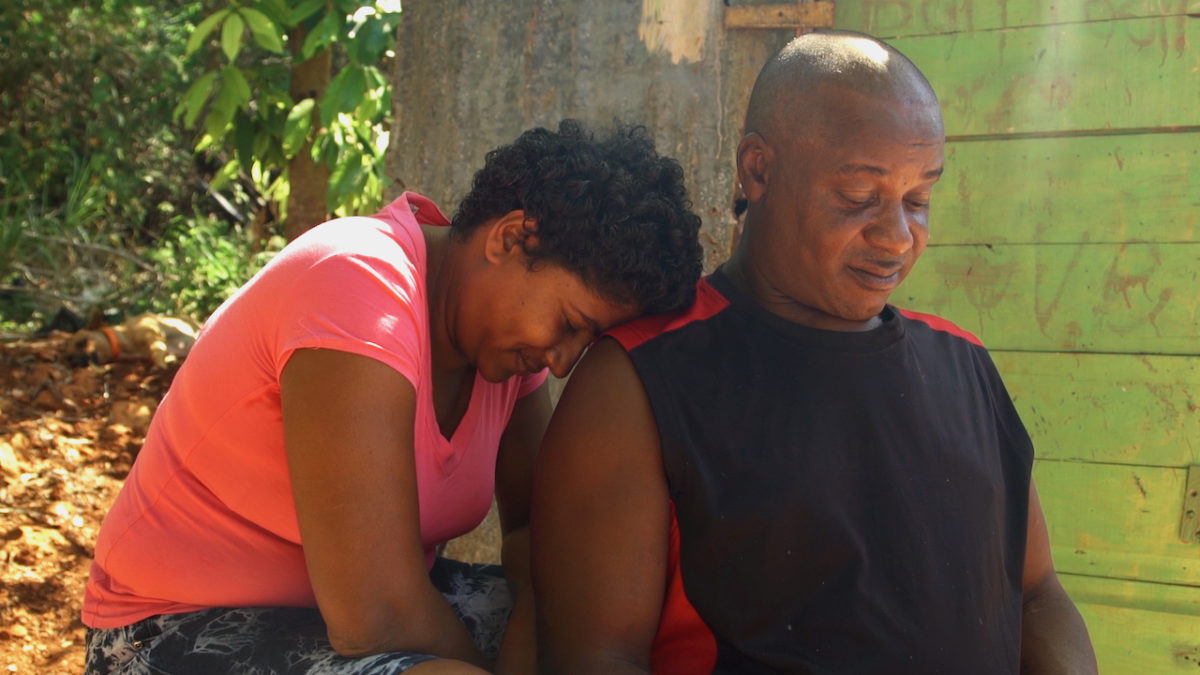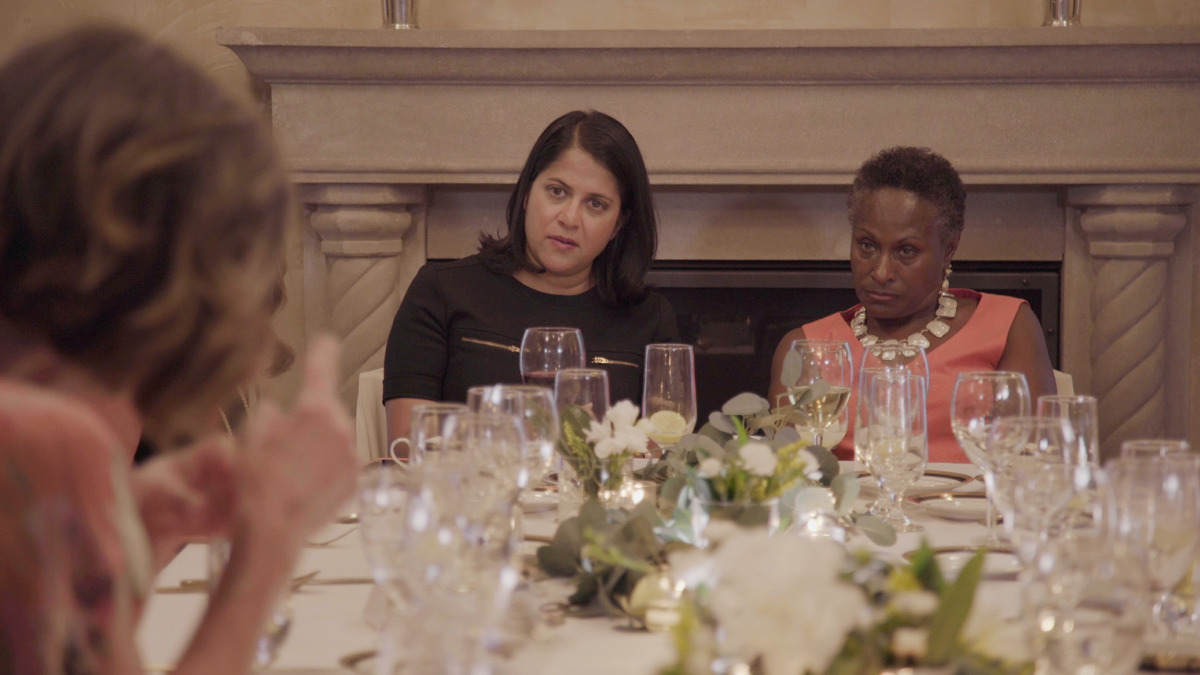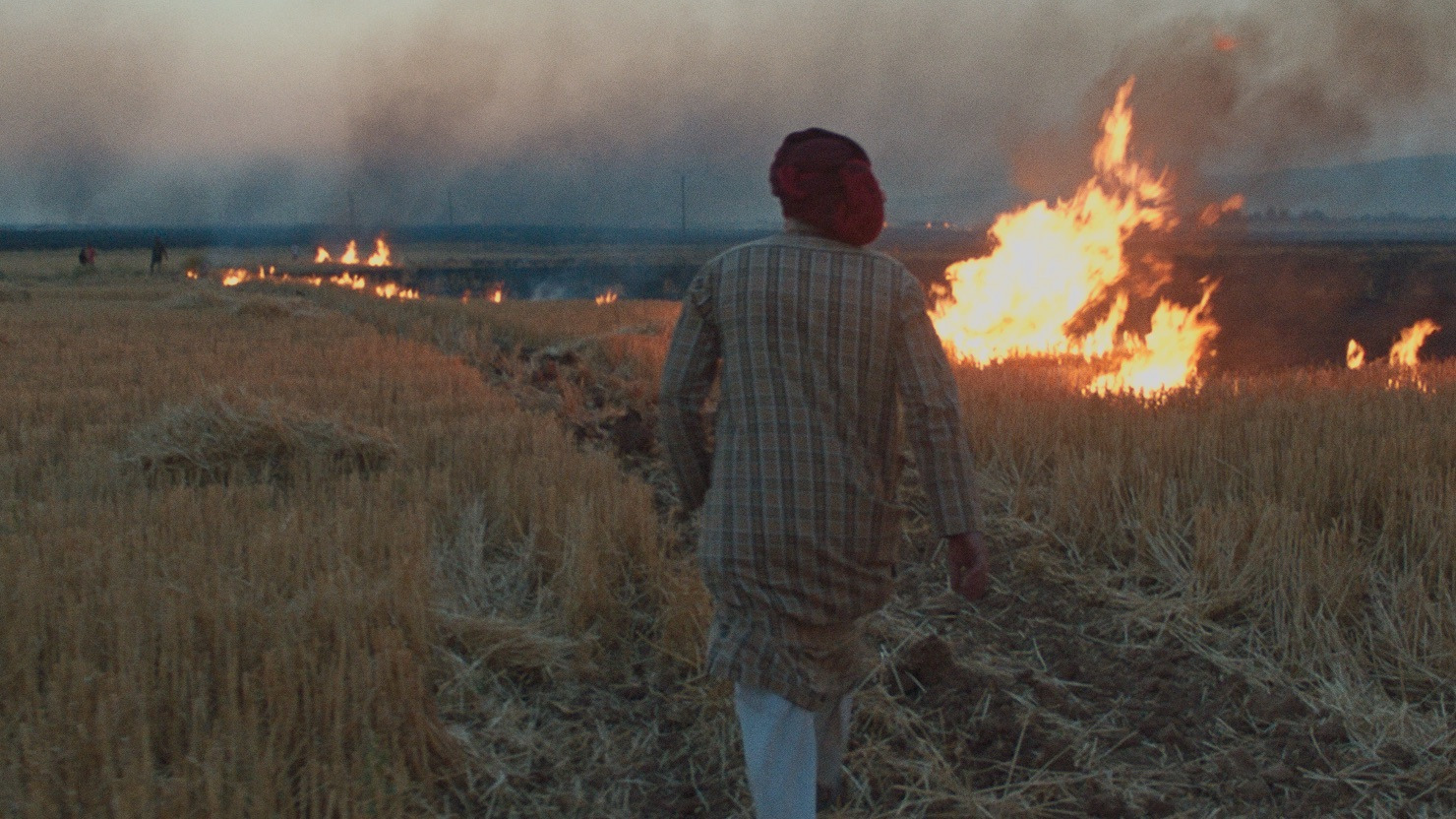On March 62020, I met Andrew Moir in a small coffee shop in Toronto’s west end. We were planning the Spring/Summer issue of POV and Andrew’s film, then called Babe, I Hate to Go, was set for Hot Docs. I loved the short film of the same name and had followed his work throughout my time at POV, so covering his first feature was something that I was eager to do. We chatted for about an hour and discussed all sorts of things about his process and the film. And then I left the coffee shop and immediately received a text saying SXSW was being cancelled due to COVID.
Festivals pivoted and eventually, so too did Hot Docs as a live edition became impossible. Moir and I kept in touch as he was one of the filmmakers who opted to defer the festival slot. While some filmmakers took to the editing rooms in 2020 to make rushed “COVID cuts” of films that now have the shelf life of a fish left on a sidewalk on a summer’s day, Moir went back to the editing room to revisit the film anew. (You can read the story in the print edition of issue #112, but it’s not reposted here as the film has changed.)
Shifting to Sophia
The film, which premieres at Hot Docs 2022 in a new version called Don’t Come Searching, benefits from the fine-tuning. Don’t Come Searching follows-up on the subject of the short Babe, I Hate to Go, Delroy Dunkley, a Jamaican migrant worker who tended to the fields at a farm in Ontario run by Moir’s uncle. The short observes as Delroy undergoes treatment for a fatal cancer diagnosis and returns to Jamaica to be with his wife, Sophia. The feature, meanwhile, picks up where the short film leaves off. This time, however, the film shifts perspective. It’s now Sophia’s story.
Moir’s camera finds a quietly compelling character in Sophia. The feature captures Sophia’s indefatigable optimism amid the family’s precarious financial situation, observing her determined analysis with the lottery. She fills a notebook with winning numbers and tries to forecast the next picks. When Delroy’s death is imminent, one can’t help but see Sophia’s loyalty to the lottery as a metaphor for a woman hoping for a miracle.
Don’t Come Searching resonates more strongly as a film about what it means to let go and move forward. In the two years that have passed, our priorities have shifted, and life’s changed. Like Sophia, all we can do is move forward.
POV spoke with Don’t Come Searching director Andrew Moir (from Toronto) and producer Michelle Serieux (from Saint Lucia) via Zoom ahead of the film’s Hot Docs premiere.
POV: Patrick Mullen
AM: Andrew Moir
MS: Michelle Serieux
This interview has been edited for brevity and clarity.
POV: What went through your heads when Hot Docs cancelled the live event and shifted to virtual in 2020?
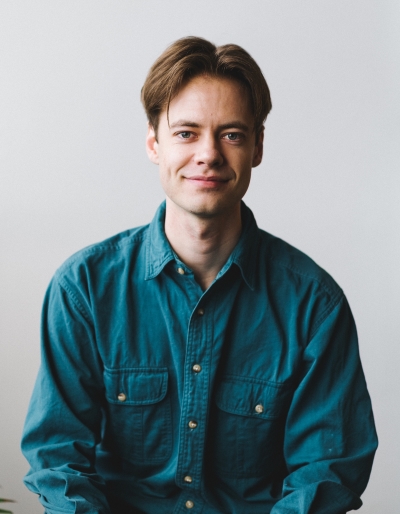
AM: I remember when I was filming with Sophia and she was writing her lottery numbers in her book. She told me that she wanted to travel the world. That’s when I said to myself, “If she’s the subject of the film, then I really want her to come to Hot Docs for the festival to give her this experience.” That was a goal of mine for years. When Hot Docs was unsure what was going happen, it was evident to me that if she couldn’t be here, then the film shouldn’t be in the festival.
MS: It was taking Hot Docs a while to decide what was happening. All these other festivals were canceling and they weren’t quite sure yet, so we were having the conversation about how, if Sophia can’t come, then it doesn’t make sense to go. If it were just going to be an online festival, then the experience for her would be lost because she’d never been to Canada all the time that Delroy had been going to Canada. It was important for both of us for her to be there. We made the decision to pull out and we did a lot of editorial work. The film is very different from when it was two years ago too. I think everything’s come full circle since she’s going to be present, which is really exciting.
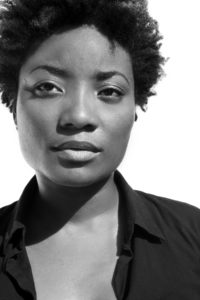
POV: What inspired you to look at the film again and go back to the editing room?
AM: I was thinking a lot about the feedback that I had gotten from people. The film is really about how someone tries to be strong in the face of learning that someone is going to die, and seeing them dying and how they cope with it. Sophia approached that with a level of grit and toughness, but something that I felt was lost was the heart and the warmth that she has. When the [live] festival was cancelled and we had to wait with the film, I thought about how we could bring in some of the heart that I felt was missing and that other people had told me that they didn’t see. I spent a lot of time looking at the footage and I never really actually felt like it was quite captured the way it could have been.
POV: Michelle, how did you feel about look at the film again?
MS: I was very open to that process. It was important to tell Sophia’s point of view. This was her story as well. In the short, we got Delroy’s perspective one-hundred percent, but I felt that there were moments where we could make the narrative more about Sophia. Andrew decided to go to Jamaica to shoot her a little bit more and to get some key interviews with her, which was an amazing decision because it’s given the film a different quality. It is now more representative of Sophia and her point of view. As a Black woman from the global south, I’m happy, and as a woman from the rural Caribbean, I’m happy to see a story like that being told as well.
POV: I really liked the cut I saw in 2020, but this version hits with a different impact and you do feel the warmth. Last time, I remember talking about how I loved the motif with Sophia and the lottery. Is the opening scene of her playing with the lottery a new edit? I think the Hot Docs 2020 cut started with Delroy singing “Leaving on a Jet Plane,” which is now the second scene.
AM: The beginning of the story of the film was really the beginning of my relationship with Sophia. I didn’t know her that well when we started filming. I had lots of great footage with Delroy because I had known him for around 10 years and had been filming with him for quite a bit, but the film ended up being about Sophia. The challenge was establishing the film being about Sophia when we didn’t have great footage of her at the beginning of the story. Now the story begins with Sophia’s voiceover, which I recorded a couple months ago—I’ve known Sophia now for seven years, so we now have a relationship. The voiceover shows the warmth of our relationship.
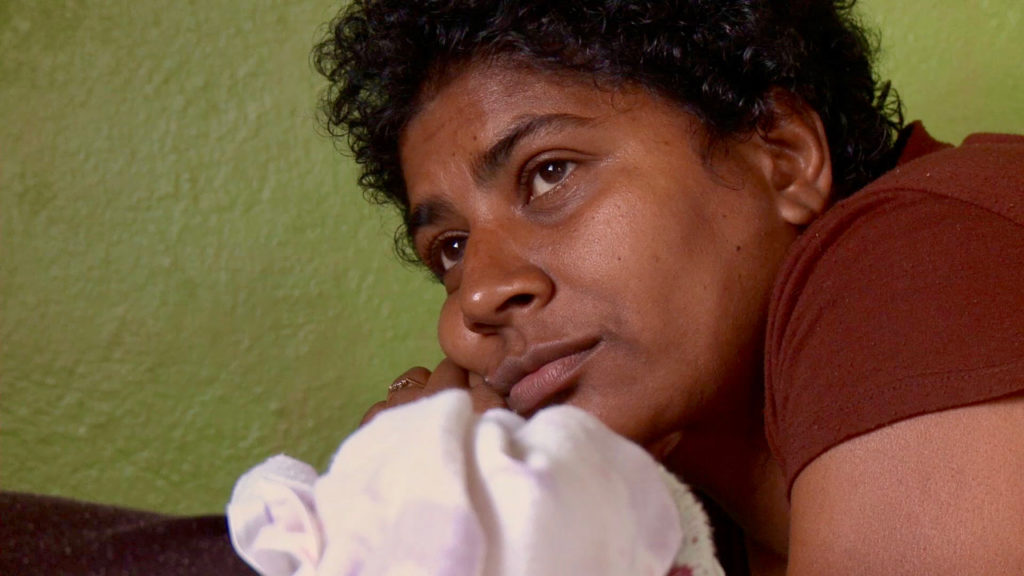
POV: The past two years have been 24/7 new cycles about COVID and the pandemic, so what has it been like mentally to work on a film about death and the grieving process?
AM: For me, this is a space that I work in. I make films about people who are grappling with dying. I’m making another one and I’ve made a couple in the past. It’s something that I am comfortable exposing myself to every day. I never felt like the pandemic was wearing on me too much when it comes to this film, to be honest. I don’t know how much the outside world really impacted the development of the film, but in my personal life, when people died separately from COVID—my dad died in 2019—those events effected the way I see the film and how I try to construct a character’s mindset. They’re going through something that I too have gone through.
MS: There were two levels for me. I remember being on a call when COVID had just hit and all the festivals were being cancelled. There was a little group with Chicken and Egg Pictures for producers who had films that were cancelled. I remember being very anxious about whether we would have space in any programming in two years’ time, whether people would have been so overwhelmed that no one would want to see a film about death. On another level, with the theme and Andrew’s father dying, and I had a stillbirth, it was something that we were both grappling with while we were making the film. Seeing Delroy’s death and the way it was handled with the nine nights ritual afterwards, it felt interesting to present that to the world so they could recognize that death is a huge part of life. Audiences are going to have to face this anyway, so we should confront it head-on regardless.
POV: I don’t know if I just sense the passage of time differently now than I did two years ago, but Delroy’s death doesn’t have the same looming effect here. This version really emphasizes Sophia’s strength and she has to move on for her family.
AM: I think some people might see it as a film about someone dying since Delroy passes away, and then the film continues quite quickly. That was a choice we made to show Sophia picking up the pieces pretty quickly and trying to get her life together.
MS: Absolutely. At one point, the film’s tile was about her strength, Hold Strong, because that was always her narrative. Even when Delroy was alive, she didn’t have much agency and control over the circumstances around her life with his death, but she was so stoic. Andrew at one point said that he was able to take some strength himself from her strength. It was very important to be truthful about how she faced her circumstances.
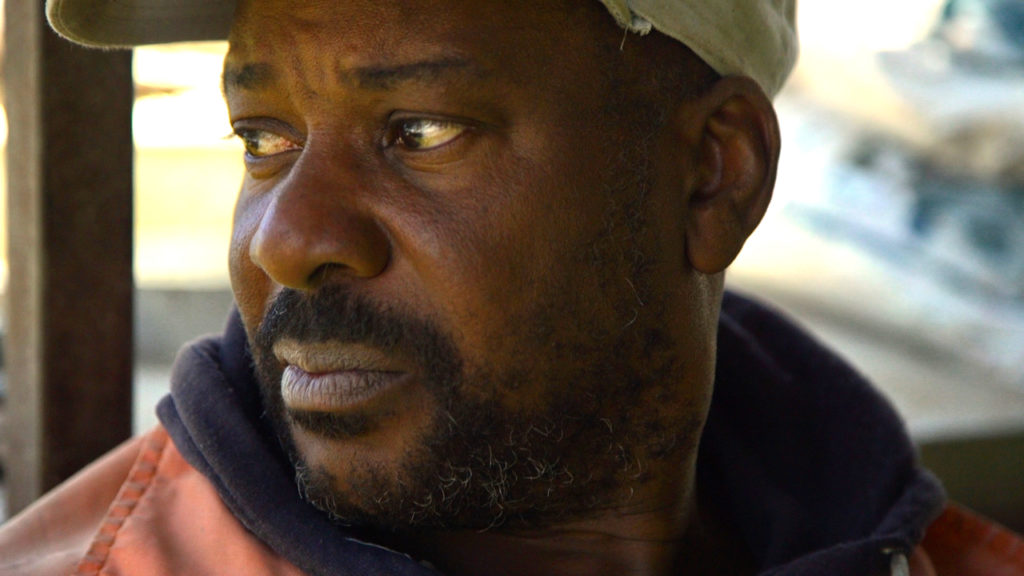
POV: How did your working relationship function during the pandemic and remote work?
AM: I got into my head the first year of the pandemic that I wanted to go to Jamaica and try the voiceover. At first, we thought it would be a couple of months, but then we had to push it off. I also just talked to Sophia and asked her what she was comfortable with. We eventually settled on a date a couple months after I was vaccinated while it was still warm in Canada and people weren’t gathering inside too much.
MS: But you had played with bringing her up to Canada at one point, right? Of getting her and Brianna to come?
AM: I had played with that idea.
POV: Why was it important to go there instead of just being having Sophia give her thoughts over the computer?
AM: We talked about that too, but there was just a logistic technical challenge when it came to figuring out how to do that with Sophia and Brianna. My original plan was to do the voiceover with Brianna over Sophia, but Brianna had grown up in a way where it didn’t feel right anymore, so I ended up pivoting to Sophia. But I also wanted to show her the film again because I had made changes and wanted her feedback.
POV: How did you first connect as producing partners on the film?
AM: I found Michelle on a website. There’s also a very good film scene in the Caribbean and for Caribbean diasporic filmmakers. My short screened at Third Horizon Film Festival, and I reached out to a programmer and asked her if she knew Michelle.
MS: [Laughs] I got this email from Andrew introducing himself and asking if I was available. He wanted someone to challenge him and he needed a producer who was au courant with Jamaica and with the subject matter. I was so tough on him in the process of vetting him: why are you telling this Black woman’s story, you know? He told me about his relationship with Delroy and we developed a good relationship. He’s very open to constructive feedback. It also kept me in a place where I felt like I was still able to be a filmmaker over the two years of this pandemic. We have actually not met in person yet. Our entire relationship has taken place over Zoom.
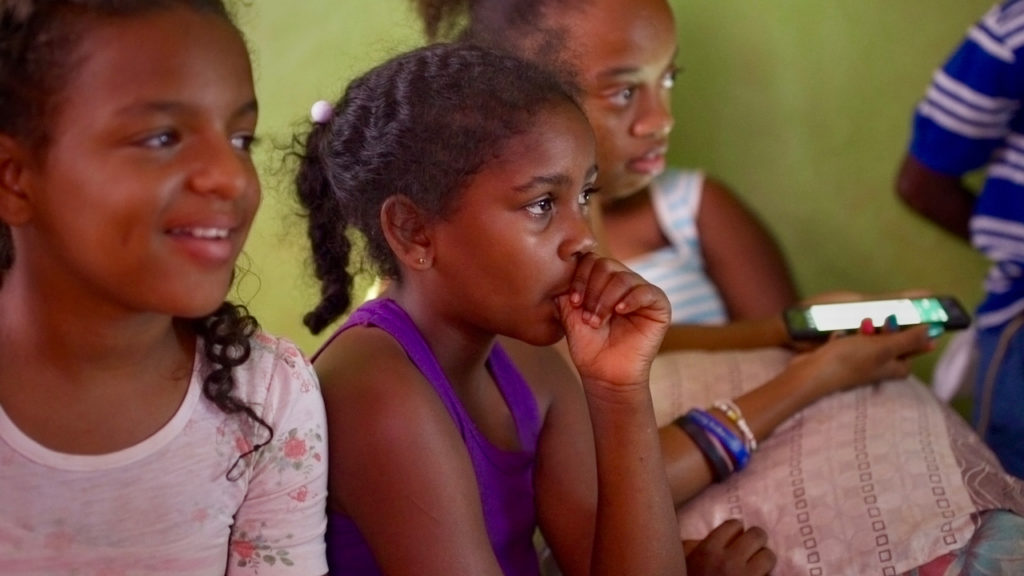
POV: How do you feel about finally letting go of the film?
AM: I’m excited. It’s been a long time for me. I started making this film when I was 24-25 years old. Now I’m 31 years old. When I watch it, I feel like I’m watching the work of a different person. That’s good in some ways because it means that I’ve grown. I also feel like letting go means that I can have a relationship with Sophia without our friendship being mediated by a film. But I need to be careful that I don’t let any eagerness to let the film go make me neglect it because it is at an important stage.
MS: I see it a little differently: I completely understand working on something so many years and now it’s come to the end. In building our own friendship and professional relationship, there’s other work that I’ve been developing and Andrew has been my sounding board. I’m happy that the film will interact with audiences and Caribbean audiences because Jamaica’s not the only island to have farm workers program just sent off. It was in the news maybe two nights ago that the first batch of female farm workers is going to Canada. I think they’re going be working in Nova Scotia picking fruit.
POV: I have to ask about the title change because Babe, I Hate to Go was such a good name. Did you change it with each edit?
AM: I have changed the title for this movie so many times, but the one I liked most was Babe, I Hate to Go, which was the title of the short film. This film is very different from the short film. When I decided to figure out the voiceover, I watched a lot of the footage all over again. One my favorite scenes is when Sophia and Brianna are at the nine nights, which is the drumming party after Delroy dies. It’s a wake. I was going through the project file and there were all of these muted subtitle tracks. I decided to unmute them and I realized that the translator who did that scene, Vernadette Scully, had translated the lyrics of the songs.
The song that I really love was called “Don’t Come Searching,” which is a church song from the perspective of someone who’s died telling a loved one to not go looking for them because they’re gone and they’re not going to come back—and if you’re gonna look for me, go to the house of the Lord, or something like that. I found this instruction really apt to describe how Sophia was dealing with Delroy’s death and how she was trying to help her daughter move on. There’s a scene where Sophia tells her, “You have to be strong. You have to like stop crying.” It all made so much sense when I saw the song lyrics.
MS: When he told me the story behind it, I thought it was so harsh: “don’t come searching.” Then when he told me about it being from a gospel song and about the translation, it actually adds so much more context and nuance.
Don’t Come Searching premieres at Hot Docs on May 2.




